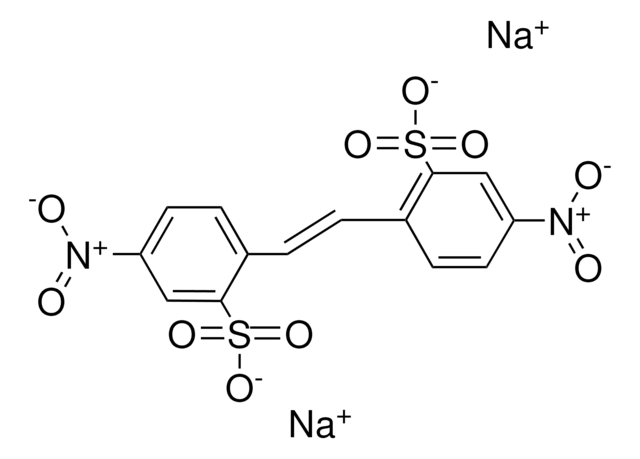368598
4,4′-Bis(2-benzoxazolyl)stilbene
97%
Synonym(s):
1,2-Bis(4-(benzo[d]oxazol-2-yl)phenyl)ethene, 2,2′-(1,2-Ethenediyl)bis(4,1-phenylene)bisbenzoxazole, 2,2′-(1,2-Ethenediyldi-4,1-phenylene)bis[benzoxazole], 2,2′-(Vinylenedi-p-phenylene)bisbenzoxazole, 2-[4-[2-[4-(1,3-Benzoxazol-2-yl)phenyl]ethenyl]phenyl]-1,3-benzoxazole, 4,4′-Di(benzoxazol-2-yl)stilbene, p,p′-Bis(2-benzoxazolyl)stilbene
About This Item
Recommended Products
Quality Level
Assay
97%
form
powder
mp
>300 °C (lit.)
λmax
372 nm
SMILES string
c1ccc2oc(nc2c1)-c3ccc(\C=C\c4ccc(cc4)-c5nc6ccccc6o5)cc3
InChI
1S/C28H18N2O2/c1-3-7-25-23(5-1)29-27(31-25)21-15-11-19(12-16-21)9-10-20-13-17-22(18-14-20)28-30-24-6-2-4-8-26(24)32-28/h1-18H/b10-9+
InChI key
ORACIQIJMCYPHQ-MDZDMXLPSA-N
General description
Application
Signal Word
Warning
Hazard Statements
Precautionary Statements
Hazard Classifications
Eye Irrit. 2 - Skin Irrit. 2 - STOT SE 3
Target Organs
Respiratory system
Storage Class Code
11 - Combustible Solids
WGK
WGK 1
Flash Point(F)
Not applicable
Flash Point(C)
Not applicable
Personal Protective Equipment
Choose from one of the most recent versions:
Certificates of Analysis (COA)
Don't see the Right Version?
If you require a particular version, you can look up a specific certificate by the Lot or Batch number.
Already Own This Product?
Find documentation for the products that you have recently purchased in the Document Library.
Our team of scientists has experience in all areas of research including Life Science, Material Science, Chemical Synthesis, Chromatography, Analytical and many others.
Contact Technical Service


![4,4'-diamino[1,1'-biphenyl]-2,2'-disulfonic acid AldrichCPR](/deepweb/assets/sigmaaldrich/product/structures/132/504/f9fd296f-c246-427d-9118-23f7b80e2be1/640/f9fd296f-c246-427d-9118-23f7b80e2be1.png)






